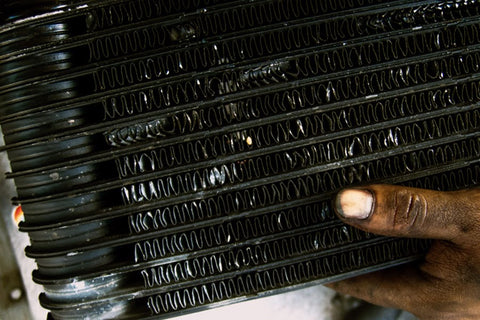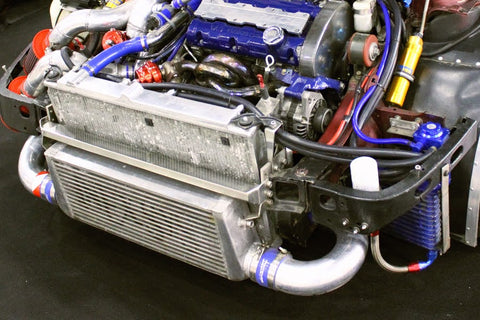Diesel engines with turbochargers have many components that ensure they reach their maximum performance. One of the vital parts is the intercooler. But what is a turbo intercooler? Why is it so important for your turbocharged vehicle?
If you want to get all the answers to these dilemmas and learn about turbo intercoolers from experts, you are in the right place. This informational article is one of the many attempts we make to educate our Goldfarb and Associates clients.

Source: shutterstock.com / Photo Contributor: spmodify
What Is a Turbo Intercooler?
A turbo intercooler is a mechanical part that diesel vehicles have. They are crucial components in forced induction systems.
We categorize the vehicle parts as heat exchangers, and their purpose is to cool the intake air on turbocharged or supercharged engines. They have end tanks, piping, and core.
Here is your first expert tip from us: The location of the intercooler depends on the type of engine and intercooler your vehicle has. You can figure out where they are located according to their name. So, there are:
- Top-mount or TMIC, which is located on the top of the engine.
- Side-mount or SMIC, which is located toward the front of the vehicle at the side inlets of the bumper.
- Front-mount or FMIC that you can find in the front of the bumper opening.
These are the three most used locations for turbo intercoolers. They come in various designs that can greatly influence their cooling and airflow properties.
How Does Turbo Intercooler Work?
The intercooler dissipates heat by pushing it through the intercooler and sending it to the atmosphere via its fins and plates. This simple process helps the engine run more efficiently and prevents it from overheating.
What does a turbo intercooler do?
One of the main functions of turbo intercoolers is to improve the combustion efficiency of turbocharged and supercharged engines. When such engine settings compress the intake combustion air, the internal energy generated raises the temperature. The hot air created is less dense than it should be and reduces the combustion efficiency.
That is when the turbo intercoolers do their part. They play a vital role in removing the excess heat that is generated during the compression of air. The intercooler transfers the heat to a coolant, which may be air or water.
Types of Turbo Intercoolers
The turbo intercoolers are divided into two categories depending on the type of coolant they use. There are air-to-air and air-to-fluid intercoolers.
Air-to-air intercoolers
The air-to-air intercoolers are typically covered by several overlapping tubes. After the heated air enters the intercooler, it goes through the external tubes that cool it down.
Air-to-air intercoolers can be either front-mount or top-mount, depending on the location you should install them. However, in our experience, the better option is to go with the front-mount placement.
Pros
- Simple and effective design
- Low cost
- Easy to set up and lightweight
- Doesn’t require a power source to work
Cons
- Its efficiency depends on ambient air temperature and airflow
- Has a higher temperature than air-to-water types
Air-to-fluid intercoolers
Air-to-fluid intercoolers are also known as air-to-water. As the name suggests, the heated air is cooled down by water.
The air is pumped into the intercooler and transferred into the coolant liquid. Then, when the compressed air is cooled, it will be sent back into the intake engine's intake manifold.
Pros
- Highly efficient even if smaller sizes
- Excellent application for complex installations
- Water has 13 times the heat-dissipating capacity of air
Cons
- More expensive than air-to-air
- Depends on other accessories to work
Importance of Turbo Intercoolers
The turbo intercooler is extremely important for turbocharged and supercharged cars. As the intercooler manages the heat and high temperatures, it prevents damage to the engine. It also adds to the vehicle’s performance.
In addition, intercoolers are known for their benefits, which include:
- Optimizing the air-fuel mixture for better combustion, improved engine power and torque output.
- Lowering the risks of engine detonation.
- Improving fuel efficiency.
Choosing a Turbo Intercooler
When you are browsing through our inventory to order an intercooler, you must consider several factors to ensure it is suitable for your vehicle.
- Intercooler type
- Mounting location
- Type of end tank
- Core configuration: tube-and-fin or bar-and-plate
- Fin style and density
- Inlet and outlet sizing
- Surface finish
- Connector type: OEM quick connector or silicone hose connector
Maintenance and Upkeep of a Turbo Intercooler
To ensure the optimal performance of your intercooler and, at the same time, your engine, you should regularly maintain your intercooler. You should clean it at least once a year or when you notice difficulties in its functioning.
In our experience, the most common problem intercoolers have is that they can get clogged or blocked. Generally, air-to-air intercoolers may have an external blockage, which may be visible.
Hence, you should look for any debris or dirt on the fin surface. On the other hand, the situation might be a little more complicated with liquid-to-air intercoolers because they can have internal clogging. The most common signs we’ve noticed when an intercooler needs a clean-up are:
- Engine overheating
- Decrease in engine power
- Increase fuel consumption
- Leakage from the hoses and lines
- Unusual smoke from the exhaust system
You may clean your turbo intercooler yourself or hire a professional to do it when you notice these signs.

Source: shutterstock.com / Photo Contributor: ilmarinfoto
Conclusion
Your turbocharged vehicle has many parts that allow it to function properly and efficiently. So, what is a turbo intercooler?
In brief, its purpose is to cool the air that a supercharger or turbocharger has compressed. Now that you have a deeper understanding of it, you will be more prepared when the time comes for regular maintenance or when you need to change the part.



